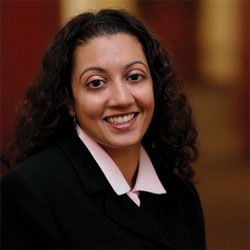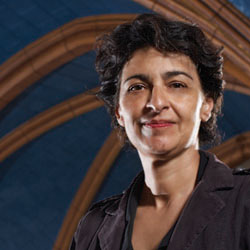Research Highlights
Research highlights
Monisha Bajaj, Professor in International and Transcultural Studies, creates the Encyclopedia of Peace Education, an online reference that charts the history and the new directions of a still-evolving field. The Encyclopedia is posted on TC’s Web site: www.tc.edu/centers/epe.
A study by Anna Johnson, Anne Martin and Jeanne Brooks-Gunn, all of TC’s National Center for Children and Families, as well as Stephen A. Petrill of Ohio State University, shows a link between household order and early reading skills. Among a group of kindergarten and first grade students, those who lived in households with less chaos and more order had more expressive vocabularies, more phonics skills and performed better on the Woodcock Reading Mastery test.
South–South: Cooperation in Education and Develop-ment, an anthology co-edited by Gita Steiner-Khamsi, Professor of Comparative and International Education, documents how, since the breakup of the Soviet Union, the flow of international aid no longer runs exclusively from north to south, from colonialist nations to those less wealthy and less developed.
A National Research Council study, led by TC faculty members Sharon Lynn Kagan and Herbert P. Ginsburg, finds that preschoolers—particularly those in low-income groups—need more and better instruction in math.
More than 120 faculty, staff and students from TC present their research and take part in panel sessions at the annual meeting of the American Educational Research Association. TC presentations include Associate Professor John Baldacchino’s session on “Knowing and Learning, Artworks and Artifacts”; Associate Professor Dolores Perin’s discussion of the “Relation of Academic Ability and Language Proficiency in Urban Community College Developmental Education Students”; and a consideration of centering race and ethnicity in a social studies content course, by Anand Marri, Assistant Professor of Social Studies and Education.
A new report by the Center on Continuous Instructional Improvement—a TC-based arm of the Consortium for Policy Research in Education—explores the concept of learning progressions and their promise for improving science instruction in American schools. As described by the report’s authors, Thomas Corcoran, Frederic Mosher and Aaron Rogat, learning progressions in science are “empirically grounded and testable hypotheses” for describing “pathways students are likely to follow to the mastery of core concepts.”
According to a study led by Aaron Pallas, Professor of Sociology and Education, despite a rise in test scores of black and Hispanic students in New York City since Mayor Bloomberg took over the city’s Department of Education in 2002, the gap separating these students from their white and Asian counterparts has not lessened and, in some cases, has even widened.
Published Thursday, Apr. 1, 2010


